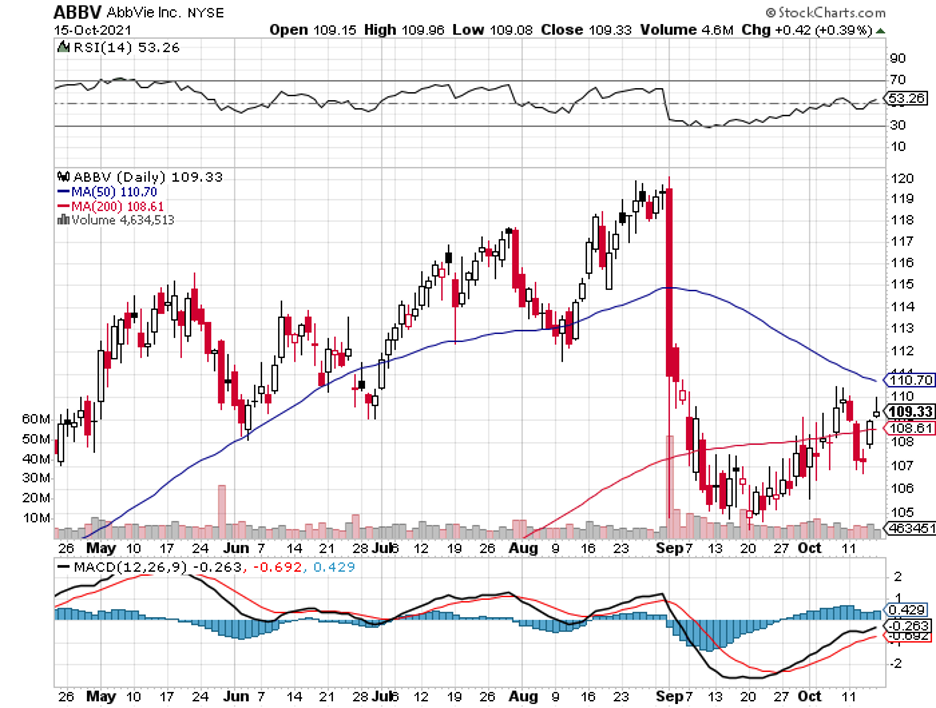A Beaten-Down Stock Poised for a Breakthrough
The market's volatility has made it difficult to find high-quality stocks at reasonable prices as of late.
Despite challenges, the key to investing is never to stray from quality.
In the words of no less than Warren Buffett, “It is better to buy a wonderful company at a fair price than a fair company at a wonderful price.”
This reminds me of one of the stocks I constantly add on pullbacks: AbbVie (ABBV).
AbbVie, which is a spinoff company from Abbott Laboratories (ABT), started trading in 2013. Since then, its name has been synonymous with its rheumatoid arthritis drug Humira—the No. 1 selling drug globally in the past years.
While AbbVie understandably relied heavily on this product for years, with 65% of its revenue coming from Humira sales in 2018, the company has already aggressively implemented ways to diversify its portfolio to prepare for the impending patent loss.
Among its efforts, one of the most exciting ones is its work with biotechnology company Regenxbio (RGNX).
AbbVie and Regenxbio have been collaborating to develop gene therapies that can treat rare eye disorders.
Basically, gene therapy is a novel approach to deal with diseases by genetically altering a patient's cells instead of the traditional method involving surgery or drugs.
AbbVie’s deal with the smaller company comprises a $370 million upfront payment to Regenxbio, with up to $1.38 billion in developmental and commercial milestones.
So far, the two have come up with RGX-314, a gene therapy candidate in Phase 2 trial for wet age-related macular degeneration (AMD).
This condition includes symptoms like blurred vision and a blind spot.
Patients can also suffer from a complication triggered by diabetes, called diabetic retinopathy, which results in damages to the retina’s blood vessels. Some cases may even lead to blindness.
In terms of the target market, the US alone has recorded over 11 million individuals suffering from some form of AMD, with the number projected to double and reach 22 million by 2050.
There’s also an urgent need for treatments for this condition, as more and more AMD cases lead to blindness annually.
In fact, diabetic retinopathy has been identified as the leading cause of blindness among adults with diabetes and the No. 1 cause of blindness among all adults in the US.
Considering the pervasiveness of diabetes and the continuously rising number of cases of this disease in the US, the number of people affected with diabetic retinopathy is estimated to virtually double from 7.7 million recorded in 2010 to over 14.6 million by 2050.
Assuming that RGX-314 gains FDA approval, AbbVie and its partner can target a market that can generate sales reaching $8.7 billion by 2025 due to the aging global population.
Meanwhile, the diabetic retinopathy segment, which has had an annualized growth rate of 6.3% since 2017, can reach up to $10.1 billion by 2025.
Given the massive addressable market, it is no surprise that the AMD segment has also attracted competitors. One of the contenders is Regeneron (REGN) with Eylea.
What makes RGX-314 more attractive, however, is that it’s a one-time treatment.
This is a massive competitive advantage over Eylea, which requires administration every four to eight weeks.
Using a conservative estimate, we can safely assume that AbbVie could take at least 8% of the market share by 2030. This would work out to roughly $2.1 billion in yearly revenue for RGX-314.
This is just one of the candidates that Regenxbio and AbbVie are working on these days, and its potential is enough to move the needle.
Other than that, AbbVie has the product portfolio from its $63 billion acquisition of Allergen, which includes the best-selling Botox.
The company also has its own homegrown drugs, cancer treatment Imbruvica, rheumatoid arthritis drug Rinvoq, and psoriasis medication Skyrizi, which all deliver strong results every quarter.
To date, they have a dividend yield of 4.7%, and the company has boosted its dividend for an impressive 8 consecutive years now.
Recently, AbbVie stock has been clobbered because Rinvoq was included in the list of drugs that the FDA instructed to carry a warning label that announced severe side effects, such as blood clots and even death.
However, AbbVie isn’t too worried about this as the company explained that the FDA based the decision on another company’s product, Pfizer’s (PFE) Xeljanz, which holds a completely different safety profile as Rinvoq.
So, what do all these mean?
This means that investors are handed a rare opportunity to buy into a solid, cash-generating biopharmaceutical titan at a massive discount.

